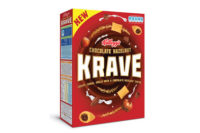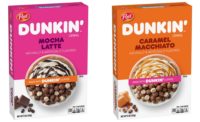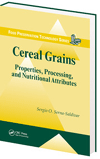A Healthy Start with Cereals and Bars
Granola grew in cereal introductions over the course of the year, as did sales for the cereal category as a whole.



“Have it your way.” Consumers can sweeten, portion according to preference.

General Mills’ new “BBB” approach: Breakfast meets bakery, biscuit technology.






The fog that has enveloped the ready-to-eat (RTE) breakfast cereal category in recent years lifted somewhat in 2013, as breakfast cereal makers saw glimpses of something that had merely been a mirage in recent years: growth.
While the overall sales may be flat, growth in market sectors like granola provided much needed optimism in 2013. In late November, category titan General Mills reported granola was enjoying 17% sales growth, year-to-date, and the firm’s new Nature Valley Protein Granola Cereal was on track to exceed $30 million in annual sales.
Granola was not only a winner at the cash register but provided abundant new product news in 2013. Granola prospered for some of the same reasons Greek yogurt has succeeded. Both foods tend to be high in protein, and protein has turned into a dynamo within the food industry.
According to Datamonitor’s “2013 Global Consumer Survey,” 29% of U.S. consumers say they try to consume as much protein as possible, the same percentage as for whole grains, but better than for calcium (at 24%) or omega-3s (at 21%). Protein is closely associated with muscle-building and satiety -- benefits that are in vogue today. And, granola makers are making the protein connection clear, as General Mills articulates that its Nature Valley Protein Granola has “more than twice the category average” for protein content.
Captains of Crunch
Granola’s crunch and versatility also figured in 2013’s wave of product launches. Highlights included Post Honey Bunches of Oats, from Parsippany, N.J.-based Post Foods, in flavors like Cinnamon and Raspberry; Kellogg’s Special K Low Fat Touch of Honey Granola Cereal with “47% less fat than the leading competitive granola;” and PepsiCo’s Quaker Warm & Crunchy Granola, in flavors like Apple Cinnamon and Cranberry Almond. The latter is served with milk and is microwaved before eating, for a warm and crunchy alternative to oatmeal. Granola even hit the oatmeal market, with Weight Watchers Smart Ones Oatmeal: billed as a “different kind of oatmeal,” topped with real fruit and granola, and sold in the freezer case by Pittsburgh, Pa.-based H.J. Heinz.
Granola has always offered great fortification opportunities, with seeds and grains holding sway in 2013. Ironman triathlon-ready Endurance Granola from Bellingham, Wash.-based Erin Baker’s Wholesome Baked Goods with 30g of ancient whole grains per serving (from chia, quinoa and buckwheat) demonstrates this trend. Back to Nature Sunflower & Pumpkin Seed Granola from Naples, Fla.-based Back to Nature delivered 23g of whole grains per serving. And, hailed as an excellent source of ALA omega-3 fatty acids was Nature’s Path Organic Granola, in a Chia Plus Coconut Chai flavor, from Richmond, British Columbia-based Nature’s Path.
Granola even dialed into one of the top ethical marketing concepts in packaged goods -- the “one for one” concept pioneered by Toms Shoes. For every bag of Impact Foods All-Natural Granola that is purchased, the Dallas, Tex.-based company promised to “feed one (malnourished) child” through its partnership with the World Food Program USA.
Outside of granola, protein fortification was hot in other types of RTE cereal. Post Grape-Nuts Fit Cereal offers “power-packed nutrition for your everyday adventure,” with generous amounts of protein and fiber. Parsippany, N.J.-based Post Foods also leveraged protein with Post Great Grains Protein Blend Cereal, in a Cinnamon Hazelnut flavor. The company says protein helps with weight management, since it generally requires 25% more energy to digest than other nutrients. Also pushing protein was Battle Creek, Mich.-based Kellogg and its Special K Protein Cereal, flagged as “satisfying hunger longer.”
“Crunch” also worked outside of granola, with General Mills’ maintaining that its Honey Nut Cheerios Medley Crunch will go down as the single largest launch in the U.S. cereal market in 2013. The product features clusters made with real almonds. It was also crunch-time for Post Foods and its Honey Bunches of Oats Greek Cereal, featuring Greek yogurt, crispy whole-grain flakes, two unique granolas and a touch of honey.
Kids’ Stuff
Chocolate was a great success in 2012, with Kellogg’s Krave cereal. And, that momentum carried over into 2013 with more chocolate cereals. Trader Joe’s Just the Clusters Chocolate Almond Granola Cereal is “on trend.” Kellogg dipped from the cholate well once again, with Kellogg’s Rocky Mountain Chocolate Factory Cereal: a limited-edition, sweetened corn cereal with chocolatey pieces and sliced almonds. Vanilla cereal showed pep in 2013, too, with General Mills adding Vanilla Chex to the Chex lineup.
The kids’ cereal market was relatively quiet in 2013, as cereal makers were careful about marketing presweetened products to kids. Views on sugar continue to evolve, with greater attention focused on the relationship between sugar and weight gain. According to the International Food Information Council’s (IFIC’s) “2013 Food & Health Survey,” 75% of consumers surveyed said they were cutting back on foods higher in added sugar as a way to improve the diet, one of the most popular steps taken.
That translates into more conservative kids’ introductions, like Kellogg’s Scooby-Doo Vanilla Flavored Cereal -- described as “crispy, lightly sweetened.” Flavors like cinnamon may offer another safe haven, reflected in the launch of Kellogg’s Cinnamon Jacks, a “crunchy, sweetened three-grain cereal with brown sugar and cinnamon,” billed as a good source of fiber and whole grains.
Tropical fruit flavors also have potential, with Post Foods adding a coconut-and-mango flavored Tropical Blends variant of Honey Bunches of Oats Cereal.
Premium Portability, Other Innovations
Portability has become increasingly important in hot cereals, as companies react to the increasing tendency to eat breakfast in a car. A 2012 NPD Group “National Eating Trends” survey found nearly 10% of breakfast meals are now eaten in a car. That’s more possible than ever today, with hot cereal options like Kellogg’s Special K Nourish -- which is packaged in a cup with a lid featuring multiple compartments of mix-in ingredients. Flavors include Cranberry Almond and Cinnamon Raisin Pecan. Cups also are on tap for Dole Real Fruit & Instant Oatmeal, in flavors like Apples & Brown Sugar and Peaches & Vanilla Walnut.
Another welcome hot cereal innovation came from Chicago-based Quaker Oats, with its Quaker Perfect Portions Instant Oatmeal. Packaged in a resealable, stand-up pouch, it allows maximum serving flexibility and may actually help cut down on waste. According to Andrew Sutherland, senior director of marketing for Quaker Oats, “More than half of moms say they have made multiple dishes during a meal in order to satisfy each family member’s taste preferences.”
Added value was a key theme for snack bars in 2013, as innovation focused on premium ingredients like nuts, fruits, grains and even Greek yogurt. Bars are expected to grow at nearly twice the rate of breakfast cereals going forward, with Datamonitor’s Market Data Analytics predicting cereal bars (a classification that includes all types of snack bars) will grow at a 3.7% compound annual growth rate in the U.S. from 2012-2015 vs. just 1.7% for breakfast cereals.
Leveraging premium ingredients was PepsiCo’s Quaker Oats unit, with Quaker Real Medleys Multigrain Fruit & Nut Bars with almonds, cranberries, walnuts, cherries, pistachios and more. The bar pulls together the three top food types identified in an Impulse Research study commissioned by Quaker that asked moms about their favorite fuel sources for the day. Fruit was favored by 60%, nuts by 48% and multigrain foods by 44%.
Speaking of premium ingredients, Kellogg introduced its first-ever product with the ancient grain quinoa, with Special K Nourish Bars. High in calcium, vitamin D and iron, this multi-grain bar comes in flavors like Cranberry Almond and Lemon Twist. And, if this wholesome ingredient trend has snack bars sounding more like trail mix, then you won’t be shocked by General Mills’ Trail Mix variety of Fiber One Chewy Bars featuring whole oats, chocolate chunks, raisins, peanuts and cranberries.
“Go Greek” Continues
One surprise in 2013 was the success of Greek yogurt bars. Rickland Orchards brought the concept to the market in March 2012 with its shelf-stable Greek Yogurt Coated Granola Bar, and the brand quickly achieved annualized net sales in excess of $50 million. That was enough for Parsippany, N.J.-based B&G Foods to snap up the company in October for $57.5 million.
Success attracts competition, and 2013 saw many new snack bars featuring Greek yogurt as an ingredient. Interestingly, Greek yogurt has succeeded as a high-profile snack bar ingredient, while real milk did not fare quite as well -- with Kraft giving up on its ill-fated MilkBite refrigerated snack bar in late 2012.
The Greek brigade included South Beach Diet Protein Fit Bars with Greek Yogurt Coating from the Bonita Springs, Fla.-based South Beach Diet Corp.; Zone Perfect Greek Yogurt Vanilla Berry Bars from Columbus, Ohio-based Abbott Laboratories; Simply Balanced Greek Yogurt Granola Bars in a Fig Nut & Honey flavor from Minneapolis, Minn.-based Target Corp.; and Nature Valley Mixed Berry Greek Yogurt Protein Bar from General Mills.
2013 was a good year for novel flavors, with new savory and spicy choices. Chicago-based Journey Bar ran with the savory bar concept in 2012 and expanded its lineup in 2013, with flavors like Pizza Marinara and Coconut Curry. The brand was conceived as an alternative to sweet snack bars that tend to be high in calories.
A similar theme popped up with Kind Nuts & Spices Snack Bar from NYC-based Kind, LLC, in flavors like Dark Chocolate Chili Almond with cascabel, ancho and habanero chilies.
Also going the savory route, but with a bar featuring nine kinds of freeze-dried vegetables -- including tomatoes and spinach -- was the Gardenbar Snack Bar from Portland, Ore.-based GardenChef Paul Co. This vegan, whole food bar debuted in five flavors, including Mexican Savory and Indian Savory.
Protein Power
Protein was a hot topic in snack bars in 2013, aided by protein’s stellar reputation. Consumers ranked protein as the third-most attractive nutrient (just behind fiber and whole grains) in IFIC’s “2013 Food & Health Survey,” with 57% saying they try to get a “certain amount” or “as much as possible” of protein.
Meat is a natural protein source, though it is not normally found in snack bars. That changed in 2013, with a meat-based line of snack bars under the Epic Snack Bar brand from Austin, Tex.-based Thunderbird Energetica LLC. Beef Habanero Cherry and Bison Bacon Cranberry bars are protein-dense, low-glycemic and free from gluten, soy, dairy, nitrates, antibiotics and hormones.
More explicit labeling on where protein actually originates may prove to be a 2013 development with legs. General Mills’ Small Planet Foods unit introduced the Larabar Alt Fruit & Nut Bar, with “Alt” alluding to an “alternative” source of protein (pea protein) used here, instead of whey or soy protein. Offered in flavors like Cinnamon Apple Crisp and Pumpkin Pie, the bar has no dairy, gluten or GMOs and has 10g of protein.
Biscuit Banquet
Looking to 2014, snack bar makers will home in on the “breakfast biscuits” opportunity, a sector Kraft created over a decade ago in France -- and that came to America in 2012 -- with belVita Breakfast Biscuits. Since that launch, more than one billion of these biscuits have been sold in the U.S., despite confusion about where to stock them. The confusion arises from the difference between the European (hard) breakfast biscuit concept, and the American perception that “biscuit” means “soft and fluffy.”
Bridging the gap is a new wave of soft, baked breakfast products, such as General Mills’ Nature Valley Soft-Baked Oatmeal Squares, a 2013 launch with a “soft and chewy texture” that pairs well with coffee, tea or juice. Mondelez’s trailblazing belVita brand did the same, adding Soft Baked Breakfast Biscuits in Oats & Chocolate and Mixed Berry flavors in 2013.
The floodgates could really open in 2014, with Kellogg’s To Go Morning Biscuits in Oats & Honey and Oatmeal Raisin flavors, each offering the “nutrition associated with cereal” in a four-biscuit serving. General Mills is readying Nature Valley Breakfast Biscuits in Honey and Blueberry flavors, offering “long lasting energy” and 26-28g of whole grains per serving. There also may be more movement in breakfast drinks, a category well positioned to chip away at the ranks of breakfast skippers. 2013’s launches of Kellogg’s To Go Breakfast Shakes and General Mills’ Bfast Breakfast Shake are likely a sign of bigger things to come.
Looking for a reprint of this article?
From high-res PDFs to custom plaques, order your copy today!











